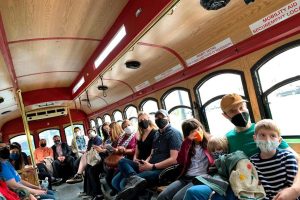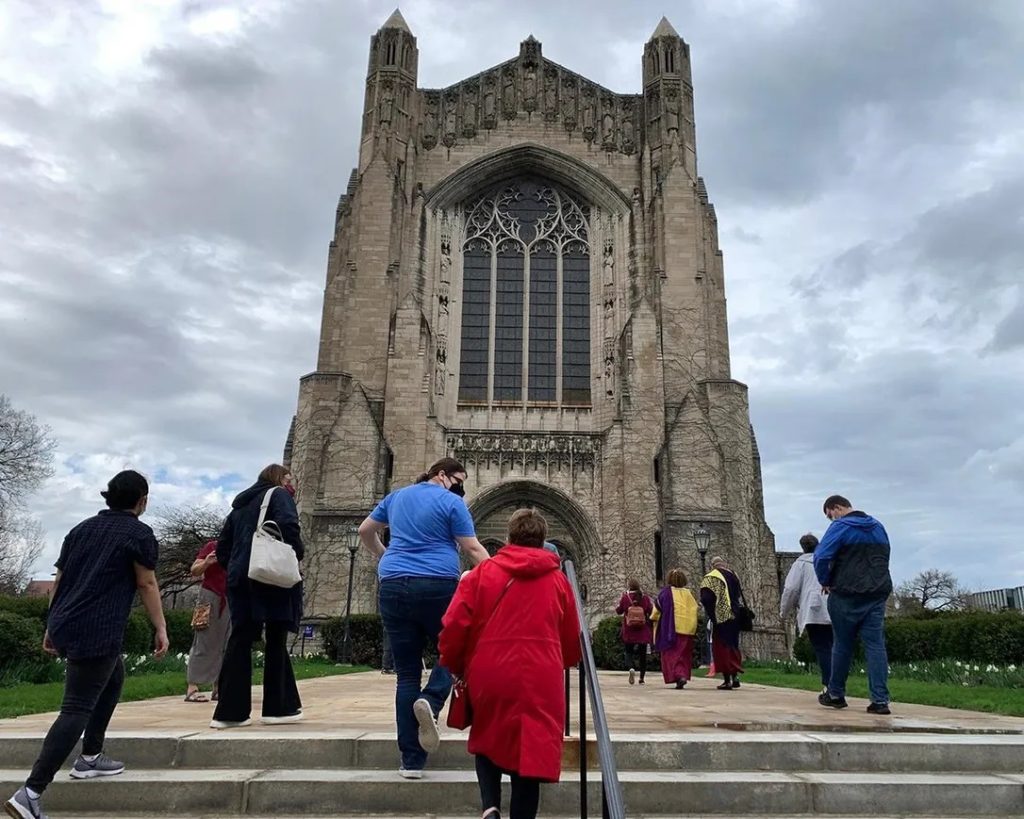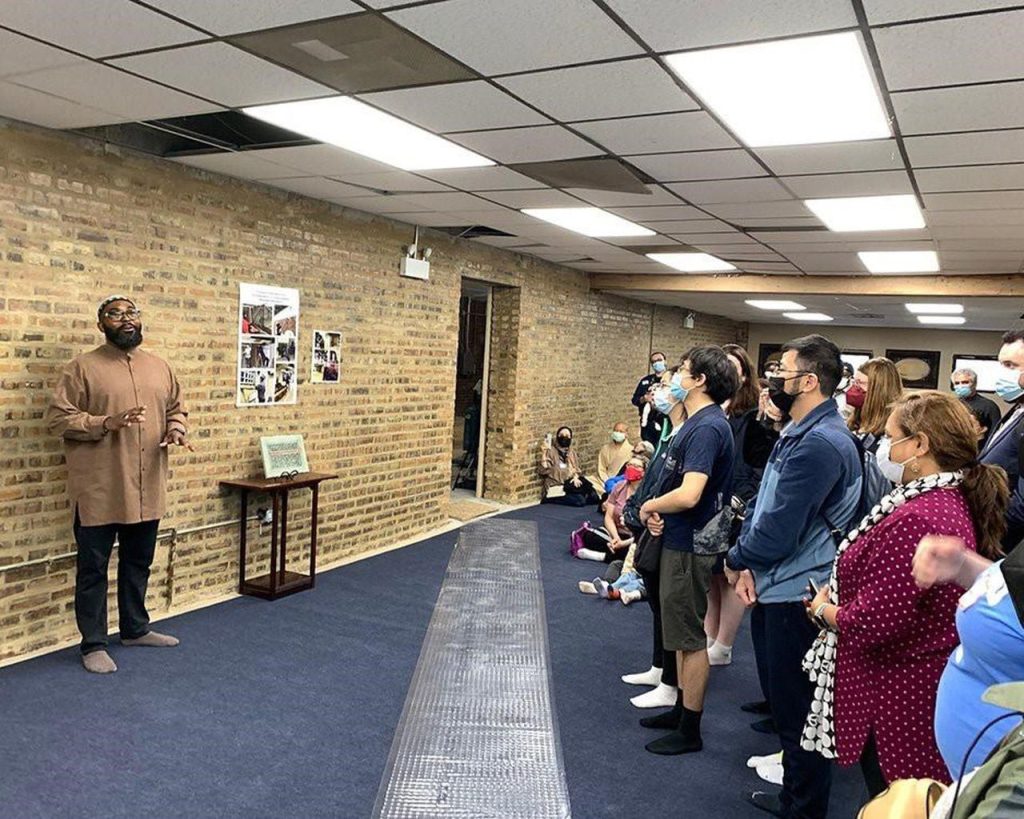In America’s third largest city, it’s possible to get a crash course in the world’s religions in a journey of just a few miles — from the University of Chicago’s majestic, ecumenical Christian Rockefeller Memorial Chapel on Chicago’s South Side to the humble Masjid Al-Taqwa, which meets in a converted stable, still under renovation a 15-minute ride to the south.
On Orthodox Christian Easter (April 24), 70 or so passengers took that ride on the Interfaith Trolley, a tour of sacred spaces inspired by this month’s convergence of Ramadan, Passover, Easter, Vaisakhi (celebrated by Sikhs), and Ram Navami (a Hindu holiday).

Perhaps more reminiscent of speed-dating than a comparative religion course, the tour made brief stops at five religious sites across southeast Chicago, hearing from a series of faith leaders and lay people from different religious groups.
Sponsored by local faith institutions such as American Islamic College, the Lutheran School of Theology, Chicago Theological Seminary, the Parliament of the World’s Religions and the Hyde Park & Kenwood Interfaith Council, the trolley was intended to promote interfaith understanding and cooperation.
“This was a beautiful event, far more beautiful than I expected,” said Kim Schultz, coordinator of creative initiatives at the InterReligious Institute, part of Chicago Theological Seminary. “The words shared and the community shared really struck my heart.”
“This is an incredible opportunity to come together to educate our communities and shape the public narrative about what it means to live well together amidst our religious and cultural diversity and difference,” organizers said in announcing the event.

At the Rockefeller Chapel, Mayher Kaur, the leader of the Sikh Student Association gave an overview of Sikh practices and explained that Sikh gurus worked to overcome India’s caste system. A Hindu student told participants about Ram Navami, a Hindu holiday that fell on April 10 that celebrates the birth of Lord Rama, whose story is told in Ramayana. Shradha Jain, a Jain student spoke of her faith’s beliefs and the April 14 festival of Mahavir Jayanti, marking the birth of Jainism’s founder.
At Ebenezer Baptist Church, Patricia Butts, the church’s clerk, recounted the congregation’s musical history — Thomas Dorsey, composer of “Take My Hand, Precious Lord,” founded an early gospel choir there in the early 1930s before moving to Pilgrim Baptist Church, where the former bluesman was music director for half a century. Meeting in a former synagogue, Ebenezer remains known for its gospel music and its annual performance of Handel’s “Messiah.”
Butts also told visitors about the church’s Easter observances, including the seven last words of Jesus, and about its vibrant and dedicated congregation.
“Our senior deacon is 102 years old and still going strong,” she said.
At the Claret Center, which offers “resources for the human journey,” passengers learned about the center’s offerings of spiritual direction, meditation and acupuncture, then heard a brief meditation from Heiwa no Bushi, a BodhiChristo teacher from North Carolina, whose spiritual teaching merges Buddhism and Christianity. Bushi encouraged his listeners to “love wastefully” rather than filling their minds with worry.
“If you love wastefully, you are living fully,” he said.
At KAM Isaiah Israel, a Reform Jewish congregation whose Hyde Park neighbors include President Barack Obama, Rabbi Frederick Reeves explained how the congregation was formed over decades as several Jewish synagogues — one of them the oldest in the state of Illinois — merged, gathering in their current building in the 1920s. He also told visitors about the Jewish observance of Passover, noting that one of its key elements is that it is celebrated at home, meaning every family makes Passover their own.
“If you go to two Seders at two different houses, you’ll have two different experiences,” he said.

The tour ended up at the Masjid Al-Taqwa, a predominantly Black mosque whose members are renovating their own building after worshipping in rented space for years. Most of the renovation is being done by members of the community.
“You’ve got to dig deep. And then you have to roll up your sleeves,” Imam Tariq El-Amin told his guests.
In a talk interrupted by a sidewalk hip-hop group that began singing about “divine prophecy” while the trolley was stopped at a red light, Ayman-Nolley said that Ridvan celebrated the “springtime awakening of humans,” where people can lay down their weapons and embrace a message of love and brotherhood.
Back at the seminary, Timothy Gianotti, president of American Islamic College, gave a brief meditation on the meaning of Ramadan before an interfaith iftar dinner, where he and other Muslims broke their fast as they gathered with those of other faiths.
Ramadan is a time of revelation and a time of disruption, he said, in which Muslims draw near to God by breaking away from the distractions of the world.
“We fast from all the things that are getting in our way,” he said. “We fast from our own sense of egocentric centrality in the universe. We fast from the habits of mind and habits of being that get in our way — or in other people’s way — in terms of the spiritual life.”
Among the passengers on the trolley were Emily Heitzmann, a Lutheran pastor on Chicago’s North Side, and her mom, Barbara Heitzmann, who was visiting from Dubuque, Iowa. Emily Heitzmann said the event was a reminder of our common humanity and that people of different faiths still had much in common. Her mom agreed.
“We’re all striving for peace, being centered, and holiness,” said Barbara Heitzmann, who said she only wished that the visit to each religious site had been longer.
By: The Associated Press
